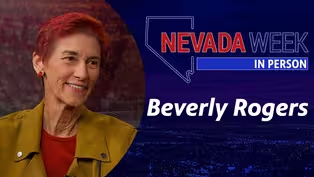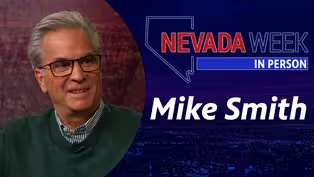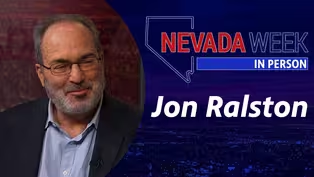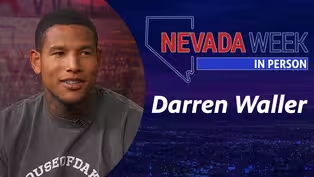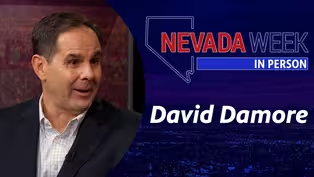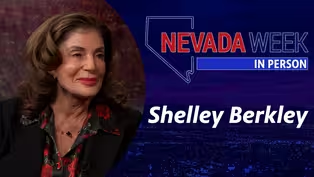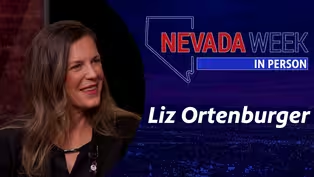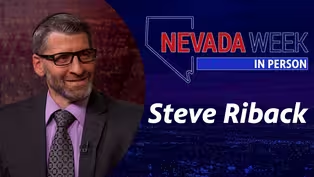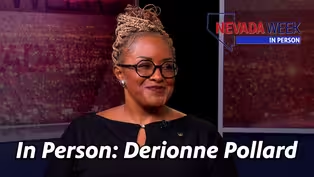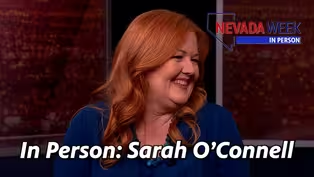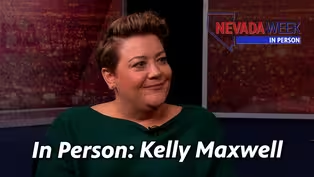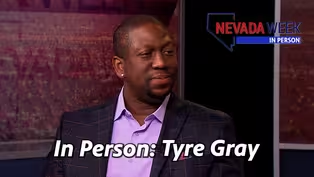
Nevada Week In Person | Phyllis A. James
Season 1 Episode 49 | 14mVideo has Closed Captions
One-on-one interview Phyllis A. James.
One-on-one interview with Foundation for Women’s Leadership & Empowerment CEO Phyllis A. James.
Problems playing video? | Closed Captioning Feedback
Problems playing video? | Closed Captioning Feedback
Nevada Week In Person is a local public television program presented by Vegas PBS

Nevada Week In Person | Phyllis A. James
Season 1 Episode 49 | 14mVideo has Closed Captions
One-on-one interview with Foundation for Women’s Leadership & Empowerment CEO Phyllis A. James.
Problems playing video? | Closed Captioning Feedback
How to Watch Nevada Week In Person
Nevada Week In Person is available to stream on pbs.org and the free PBS App, available on iPhone, Apple TV, Android TV, Android smartphones, Amazon Fire TV, Amazon Fire Tablet, Roku, Samsung Smart TV, and Vizio.
Providing Support for PBS.org
Learn Moreabout PBS online sponsorshipMore from This Collection
Nevada Week In Person goes beyond the roundtable discussion of Nevada Week with guests for a more casual conversation about their personal passions, new projects and compelling stories that are overlooked in the flurry of the news cycle.
Nevada Week In Person | Beverly Rogers
Video has Closed Captions
One-on-one interview with Rogers Foundation chair Beverly Rogers. (14m)
Nevada Week In Person | Mike Smith
Video has Closed Captions
One-on-one interview with Las Vegas Sun political cartoonist Mike Smith. (14m)
Nevada Week In Person | Jon Ralston
Video has Closed Captions
One-on-one interview with The Nevada Independent CEO Jon Ralston. (14m)
Nevada Week In Person | Darren Waller
Video has Closed Captions
One-on-one interview with Las Vegas Raider tight end Darren Waller. (14m)
Nevada Week In Person | David Damore
Video has Closed Captions
One-on-one interview with Chair of the Department of Political Science at UNLV David Damor (14m)
Nevada Week In Person | Shelley Berkley
Video has Closed Captions
One-on-one interview Senior Vice President for Touro University Shelley Berkley. (14m)
Nevada Week In Person | Liz Ortenburger
Video has Closed Captions
One-on-one interview with SafeNest CEO Liz Ortenburger. (14m)
Nevada Week In Person | Steve Riback
Video has Closed Captions
One-on-one interview with Las Vegas Metro Police Lieutenant Steve Riback. (14m)
Nevada Week In Person | DeRionne Pollard
Video has Closed Captions
One-on-one interview Nevada State College President DeRionne Pollard. (14m)
Nevada Week In Person | Sarah O’Connell
Video has Closed Captions
One-on-one interview with Director of Eat More Art LLC Sarah O’Connell. (14m)
Nevada Week In Person | Kelly Maxwell
Video has Closed Captions
One-on-one interview with Baby’s Bounty Executive Director Kelly Maxwell. (14m)
Nevada Week In Person | Tyre Gray
Video has Closed Captions
One-on-one interview with Nevada Mining Association President Tyre Gray. (14m 1s)
Providing Support for PBS.org
Learn Moreabout PBS online sponsorshipA champion of gender and racial equity and the powerhouse behind the highly regarded Women's Leadership Conference in Las Vegas, Phyllis A. James joins us this week for Nevada Week In Person .
♪♪♪ Support for Nevada Week In Person is provided by Senator William H. Hernstadt.
Welcome to Nevada Week In Person .
I'm Amber Renee Dixon.
The Foundation for Women's Leadership & Empowerment, or FWLE, is the nonprofit behind the Women's Leadership Conference which marked its 15th anniversary this year.
Before founding FWLE in 2019, Phyllis A. James was the Chief Diversity and Corporate Responsibility Officer at MGM Resorts International for more than a decade.
Phyllis A. James, thank you for joining us for Nevada Week In Person .
(Phyllis A. James) Well, thank you so much, Amber, for asking me to be here.
-You are certainly worthy.
The Women's Leadership Conference has drawn sellout crowds since 2014.
2007 was its debut, and back then it was titled Women of Color.
What led to the change in title?
-Well, my assumption of leadership of the conference is really what led to the title change.
In the beginning when the conference debuted, it was set up by a collaboration of diverse women who were leaders of the ethnic Chambers of Commerce here in Las Vegas, along with members of MGM Resorts' Corporate Diversity department.
And they really wanted to focus on issues related to the struggles or challenges for women of color in the workplace, not having a forum to focus on their issues, not having a forum to build networks, et cetera.
And as most startup enterprises go, it had a kind of rocky start.
And then when I assumed leadership of the conference as the chief corporate responsibility officer, I saw that the issues the conference was trying to address were really fundamental to women leaders, in general.
Although, of course, women of color faced unique challenges stemming from their racial and ethnic status.
And so I said, Look, we really need to have more focus to address core issues that are impediments for women in the workplace and in our communities.
So it became the Women's Leadership Conference, or WLC.
And I did a few things to focus the conference more on the challenges of women.
First, the aspiration gap between men and women.
Women tend not to see themselves as potential leaders, whereas men do.
-Why is that?
-It's socialization, because our society is run by men.
And so when you don't grow up seeing people like yourself in dominant roles of leadership, you just don't identify with that as a potential for you as an individual.
So our way of overcoming that is to have role models on stage by accomplished women on the theory that if you see it, as a woman in control, you can be it, potentially.
The second thing in which I consider the core change was focused expressly on developing leadership competencies.
You cannot excel and advance if you don't have skills.
And so it is important for women to become qualified to be leaders.
And I feel very strongly that leadership competency builds confidence.
And that's the second issue that, really, women struggle with, confidence as leaders.
If you look at studies, they'll show that even women CEOs continue to doubt whether or not they're truly competent in the role.
Imposter syndrome is a huge issue.
And the third thing is setting aside time expressly in a safe space to practice building networks.
-So implementing those skills, or teaching those skills, will lead to confidence?
-Yes.
-That's huge.
You're also making it affordable for women to obtain this knowledge.
Was there a moment in your life, though, when you realized society is not investing in me and my potential as a woman as they are for men?
-Well, I'm a little different from many, many women because early on after graduation from college, I decided to become a lawyer, and I went to law school.
-Harvard Law School.
-That's true.
And as a lawyer, you have a track of professionalism.
And so I don't think I did suffer some of the identity issues that many women who are not in specialized professions do.
Now, I always aspired to leadership, because in my corporate law firm, which is an elite corporate law firm, aspiration to partnership is what defines associates from the moment they hit the door.
-But you were talking about other nondefined or less defined roles.
-Yes.
-What would those be?
-Well, women who are generalists.
So, for instance, general management, general administration, maybe marketing, those kinds of professions that are not limited or specialized in terms of special preparation, special licensing, et cetera.
-All right.
So you did go to Harvard Law School.
And then you went on to work as Chief Legal Officer for the City of Detroit.
You're also responsible for helping to boost that city's depressed economy.
These are remarkable accomplishments for anyone, but back to women of color.
Why are they expecially remarkable for a woman of color?
And what are some of the issues women of color face?
-Well, when I was coming along in the '80s, '90s, there weren't very many people like me.
So I became the first African-American partner in my law firm; the first full-time woman corporation counsel, or Chief Legal Officer, for the City of Detroit; and later, the first African-American executive in the C-Suite on the Las Vegas Strip.
I would say that my role models were by and large men because there were not women precedents by and large and, certainly, women of color.
And the biggest difficulty, I believe, women of color face are twofold: first, developing the skills necessary to excel in professions--that is fundamental--and, second, finding sponsors who are willing to stand up and advocate for you if you have done a great job.
And fortunately for me, I was able to find male mentors and sponsors who were willing to do that.
But first, I had to put out the effort, which means I had to work twice as hard as white male peers.
And they were willing to stand up and vouch for my competency.
-Obtaining the skill set, because we go back to that.
You talked about that for all women, but is it harder for women of color?
-I think it is, because institutions in our society tend to first approach people of color, including women and men of color, as not as capable.
There is what diversity specialists call a "deficit model" when it comes to persons of color.
It is assumed that you're not as capable, you're not as educated, and therefore you won't do as big a job or as good a job.
-To this day?
-It still exists.
So you have to prove yourself.
-Oh, boy.
You talked about having male role models.
Part of FWLE's mission is to also bring in men and make them aware of how they can contribute to women's success in leadership.
What do you teach?
How do you do that?
-First and foremost, I would say our focus has been on having highly accomplished women as role models.
Many of our women, and our conference caters to women from all walks of life, have not had strong women role models so that they can see women can be highly successful.
And they're women.
And so that's what we focus on.
Not male role models, because they abound in society.
So we have had women from many different walks of life: Suze Orman, who's a financial expert; we've had women journalists like Soledad O'Brien and Lisa Ling, who, of course, excel in their professions; we've had the Chief Marketing Officer for the Dallas Cowboys, who is a woman.
-Awesome.
-Yes, exactly.
We've had the first woman coach in the NFL, as an example.
So we've had lots of women from places that you really wouldn't think of just to show that you don't have to be a man to excel.
-And perhaps I worded that wrong.
Not male role models, but do you have a responsibility to teach men how they can help women in leadership roles?
-Well, I think that all women who have been high achievers to date have been so because of men, progressive men who have said, I am looking for the best talent whether it is a woman or man.
And so I think we have said, Please be our allies in bringing other women along.
And because most institutions in America are still male dominated, we have-- we have tried to get them to champion the cause.
And by being champions in terms of advocacy, but more than that, donating resources to support the cause, because that is crucial.
There has to be commitment to the systems that are necessary to put women in the pipeline and keep them in the pipeline of leadership.
But more than that, as allies to first express the behaviors and then to promote a culture of inclusion.
Phyllis A. James, thank you so much for joining us for Nevada Week In Person .
And to see more of Nevada Week In Person , go to vegaspbs.org/nevadaweek.
♪♪♪

- News and Public Affairs

Top journalists deliver compelling original analysis of the hour's headlines.

- News and Public Affairs

FRONTLINE is investigative journalism that questions, explains and changes our world.












Support for PBS provided by:
Nevada Week In Person is a local public television program presented by Vegas PBS
